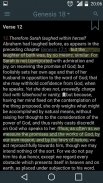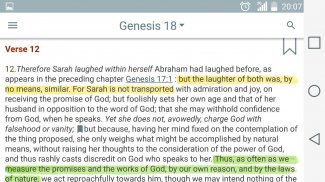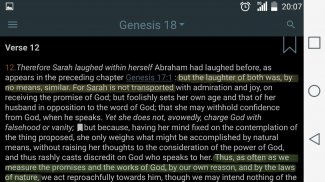













Calvin's Bible Commentaries

Calvin's Bible Commentaries介绍
John Calvin's Commentaries on the Bible
If You liked this book you can find version without advertisement in my applications: "Calvin Bible Commentary Pro"
A classic commentary on the Old and New Testaments, complete and unabridged. Written in a clear, lucid style, it combines a profound reverence for the Bible with a rare objectivity in its exegesis.
One of the most influential bible scholars of all time, John Calvin, although controversial, is a force to be reckoned with. His commentaries reflect an incredible command of the Scriptures, as he sought to integrate the entirety of its teaching by combining a solid exegetical method with a pastoral insight that is often neglected in commentaries today.
Calvin strikes a balance between passion and restraint, often infusing his writing with a distinct quality of controlled intensity. Scholars now recognize Calvin as above all else a teacher. He sought to open the Word of God in scripture to the common people from whom, he believed, the Bible had been withheld by the scholastics, monks and priests of the Roman church. By recapturing scripture's simple, genuine and natural sense, Calvin returned scripture to its rightful place in the church. His sole object as a teacher was "to lay down a pathway to the reading of sacred Scripture for the simple and uneducated."
John Calvin (Middle French: Jean Cauvin; 10 July 1509 -- 27 May 1564) was an influential French theologian and pastor during the Protestant Reformation. He was a principal figure in the development of the system of Christian theology later called Calvinism. Originally trained as a humanist lawyer, he broke from the Roman Catholic Church around 1530. After religious tensions provoked a violent uprising against Protestants in France, Calvin fled to Basel, Switzerland, where in 1536 he published the first edition of his seminal work Institutes of the Christian Religion.
Calvin was a tireless polemic and apologetic writer who generated much controversy. He also exchanged cordial and supportive letters with many reformers including Philipp Melanchthon and Heinrich Bullinger. In addition to the Institutes, he wrote commentaries on most books of the Bible as well as theological treatises and confessional documents, and he regularly gave sermons throughout the week in Geneva. Calvin was influenced by the Augustinian tradition, which led him to expound the doctrine of predestination and the absolute sovereignty of God in salvation.
Calvin's writing and preachings provided the seeds for the branch of theology that bears his name. The Presbyterian and other Reformed churches, which look to Calvin as a chief expositor of their beliefs, have spread throughout the world. Calvin's thought exerted considerable influence over major religious figures and entire religious movements, such as Puritanism, and some political historians have argued that his ideas have contributed to the rise of capitalism, individualism, and representative democracy in the West.
</div> <div class="id-app-translated-desc" style="display:none">加尔文对圣经评
如果您喜欢这本书,你可以找到的版本没有广告,我的应用程序:“加尔文圣经注释亲”
一个经典的评论在旧约和新约,完整和删节。写在一个清晰,清晰的风格,它结合了圣经的深刻崇敬,在其训诂难得的客观性。
其中的所有时间最有影响力的圣经学者,约翰·加尔文,虽然有争议,是一支不可忽视的力量。他的评论反映了圣经的一个令人难以置信的命令,因为他试图通过与经常在评论今天被忽视的一个田园的洞察力结合了坚实的训诂方法来整合其教学的全部。
卡尔文罢工的激情和约束之间的平衡,经常灌输他的写作与控制强度的不同的质量。学者们现在认识加尔文作为高于一切的一名教师。他试图打开神的话在圣经从谁,他相信,圣经一直隐瞒院学者,僧侣和罗马教会的牧师老百姓。由夺回圣经的简单,真正的和自然感,卡尔文回到经文其在教会应有的地位。他作为一名教师的唯一目的是“放下一个途径,以神圣的圣经阅读的简单和没有受过教育的。”
约翰·加尔文(中东法语:让·考温; 1509年7月10日 - 1564年5月27日)是新教改革过程中一个有影响力的法国神学家和牧师。他在基督教神学的系统后来被称为加尔文主义发展的主要数字。最初训练作为一个人文主义者的律师,他从罗马天主教会爆发周围1530后宗教紧张关系激起反对新教徒在法国的暴力起义,卡尔文逃往瑞士巴塞尔,在那里在1536年,他出版了他的开创性工作机构的第一版基督教的宗教。
卡尔文是谁引起了很大的争议不懈的论战和道歉的作家。他还交换了亲切和支持信件,许多改革者,包括菲利普梅兰希和海因里希布凌格。除了学院,他写了圣经的大多数书籍和神学论文和教派文件的评论,他经常给讲道整个星期在日内瓦举行。卡尔文是由奥古斯丁的传统,这使他阐述宿命的教义和神的救恩的绝对主权的影响。
加尔文的写作和说教提供的种子神学他的名字命名的分支。长老会和其他归正教会,这一下就卡尔文作为他们的信仰的主要解释者,已经传遍世界。加尔文的思想产生相当大的影响力,重大的宗教人物和整个宗教运动,如清教主义,以及一些政治历史学家认为他的想法促成了资本主义,个人主义,代议制民主在西方的兴起。</div> <div class="show-more-end">

























